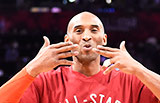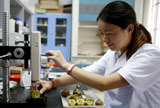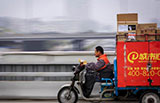Obama and Romney indulge in debatable accusations
By Chen Weihua (China Daily) Updated: 2012-10-18 02:24"And China hasn't," he said, accusing China of artificially undervaluing the yuan.
"China has been a currency manipulator for years and years. And the president has had regular opportunities to label China as a currency manipulator, but he refuses to do so," said Romney.
"On Day One, I will label China a currency manipulator, which will allow me as president to be able to put in place, if necessary, tariffs where I believe that they are taking unfair advantage of our manufacturers," Romney said.
"China has been cheating over the years. One, by holding down the value of their currency and two, by stealing our intellectual property — our designs, our patents, our technology," said the former Massachusetts governor.
"There's even an Apple store in China that's a counterfeit Apple store, selling counterfeit goods. They hack into our computers," claimed Romney.
Obama argued that, under the pressure from his administration, the Chinese currency actually has risen 11 percent. "We have put unprecedented trade pressure on China, that's why exports have significantly increased during my presidency," he said.
"Currency manipulator"
The frequency with which China was mentioned may have surprised those watching and listening to the debate, but the subject has engaged both candidates since the start of the campaign.
During a debate in New Hampshire 12 months ago, Romney claimed that he would sign an executive order on his first day in office, identifying China as a currency manipulator.
But that stance was criticized by Romney's fellow Republican, the former US ambassador to China, Jon Huntsman, who said he did not subscribe to Romney's view on international trade. "I don't want to find us in a trade war," he said.
The Chinese currency is now only undervalued by about 7 percent, compared with the 40 percent figure suggested two years ago, according to a report from the Peterson Institute for International Economics in Washington four months ago.
With China's currency rising by 30 percent since 2005 and the narrowing current account surplus, experts believe it does not make sense to pressure China for greater appreciation.
On Friday, the US Treasury Department delayed its report on the exchange rate policies of its trading partners until after a meeting of G20 finance ministers and central bank leaders next month.
While Romney and his running mate Paul Ryan took the opportunity to attack Obama's policy on the yuan during weekend campaigning in Ohio, some US companies, such as GE and Caterpillar, have been overwhelmingly supportive of Obama's decision not to label China a currency manipulator.
Even Marco Rubio, the Republican Senator from Florida who introduced Romney at the Republican National Convention in August, told Bloomberg News on Tuesday that he does not think it would be a good idea for Romney to label China a currency manipulator. "It could kick off a trade war that would be bad for the economy," he said.
China is now the fastest-growing export market for the US and its third-largest export market, trailing only Canada and Mexico.
Some experts said that while a large number of observers don't expect Romney to keep his promise if elected, some were concerned that he may be forced to do so to avoid attacks for breaking his promise.
- Beijing bigamist jailed after fourth marriage ends in divorce
- Former convicts coming in from the cold
- Fraud fugitive on most wanted list has been arrested
- Beijing's tobacco control efforts now bearing fruit
- Strong tremors felt in Tibet after Myanmar quake
- Li: Central govt to decide local share of new tax
- Xi says protecting relics a priority
- Xinhua Dictionary sets two Guinness World Records
- Shenzhen to set specified rules for express vehicles
- Shared business flights are under way








